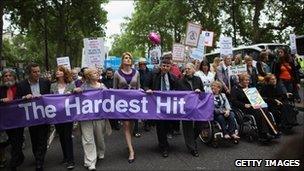Disabled people stage protest over spending cuts
- Published

The protest was held on the first anniversary of the formation of the coalition government
Disabled people and their families have held a protest in central London against government spending cuts.
Organisers are calling it the Hardest Hit Protest, and say they want to send a message to ministers to scrap cuts.
The demonstrators, from across the country, object to cuts in disability living allowance, benefit changes and local service cutbacks.
Ministers say the welfare system is failing people and that reforms will see benefits go to those who need them.
But protesters point to recent research by the Demos think tank which found 1.48 million disabled people are set to be worse off by a total of £374m in 2011.
The protest, organised by the UK Disabled People's Council and the Disability Benefits Consortium, comes on the first anniversary of the formation of the coalition government.
Cancer treatment
Amanda Burt, a protester who travelled from Aberdeen with charity for the blind RNIB Scotland, said she would no longer be able to take taxis if the cuts went ahead.
That would mean she would have to forgo her keep-fit classes and voluntary work with other braille users, she said.
She told the BBC: "I think what they are doing is making the most vulnerable suffer - that's the bit I can't get my head around."
Jaspal Dhani, of the UK Disabled People's Council, said people were taking to the streets out of anger.
"Disabled people are the hardest hit and they are coming together to say loud and clear 'stop the cuts and protect our rights'," he said.
They are calling on ministers to:
scrap plans to cut disability living allowance, a benefit paid to 3.2 million disabled people, including children, which helps many to live independently
make sure employment and support allowance, the successor to incapacity benefit, has a fair assessment, does its job and supports disabled people
stop cuts to services which are essential to disabled people's quality of life, such as day care, transport and respite care services
Some 40 charities and organisations including Scope, Leonard Cheshire Disability, Mencap, the RNIB and Sense, have indicated that they will be represented on the march, the organisers said.
Liam Byrne, shadow secretary for work and pensions, told the BBC: "We think [the government's] welfare changes are descending into chaos, they have not thought them through.
"We don't think it's right to cut benefits from people who are still receiving treatment for cancer and making people prisoners in care homes.
"Disabled people will be pushed into poverty. David Cameron has to show that he gets it, that he's prepared to protect people's disabilities."
'Independent lives'
Earlier, Mr Byrne and Labour MP Dame Anne Begg, chairman of the work and pensions select committee, addressed a rally in Victoria Embankment ahead of the march along Millbank.
A spokesman for the Department for Work and Pensions said: "Our commitment to help support disabled people live independent lives runs at the heart of our welfare reforms and severely disabled people who need support will always get it.
"The system we have at the moment is not fit for purpose and is failing disabled people.
"We are reforming welfare to make sure that the billions we spend on benefits goes to those who need it and that for the first time disabled people get proper help and support to live independent lives and work in the mainstream jobs that they want."
To coincide with the day of protest, six charities, including the MS Society, have published a report calling for changes to the benefits assessment to make it fairer for people with a fluctuating health condition.
It says huge numbers of people with conditions like multiple sclerosis, Parkinson's, HIV or arthritis are wrongly being found fit to work after undergoing a Work Capability Assessment (WCA) because it focuses only on their "good days".
These assessments are carried out to decide whether a person is entitled to the out-of-work disability benefit, employment support allowance.
- Published11 May 2011
- Published28 April 2011
- Published8 January 2011
- Published8 January 2011
- Published11 November 2010
- Published11 November 2010